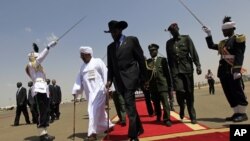STATE DEPARTMENT -- The Arab League has joined United Nations and African Union in pressing Sudan to allow the delivery of humanitarian aid to the provinces of Southern Kordofan and Blue Nile, where aid agencies say more than 140,000 people need more food.
But opening humanitarian access to the region is complicated by the continuing rebellion there. According to Sudanese rebel leader Abdelaziz al-Hilu, fighters in the Nuba Mountains who were not eligible to secede along with South Sudan last July are still battling Sudanese Armed Forces (SAF).
"We have a just cause, but SAF troops are fighting for money," says al-Hilu. "They are defending a defunct regime, a failed regime, a fundamentalist regime, so they have lost the motive and incentive to fight."
But Sudanese President Omar al-Bashir says South Sudan is helping the rebels, and that he will not sit by while the new government in Juba threatens national security.
"If they want to change the regime in Khartoum, we will work to change the regime in Juba," says al-Bashir. "If they want to support rebels, we will support rebels there."
South Sudanese President Salva Kiir says Khartoum is already backing militia raids into the south.
U.S. officials support the Arab League's decision to join the United Nations and African Union in efforts to convince Khartoum to allow international aid agencies into Southern Kordofan and Blue Nile.
"[The absence of international aid agencies] is contributing to the border insecurity because it spills over," says Princeton Lyman, U.S. special envoy to Sudan and South Sudan, explaining that the move could help to ease the conflict. "And it is also creating a humanitarian crisis."
But both countries, he adds, are contributing to the problem.
"We need to have both governments realize that this is a self-defeating proposition," he says. "Each one does it, the other one does it, and both of them suffer."
John Bradshaw, executive director of the U.S.-based Enough Project to end genocide, says an ongoing humanitarian crisis only obstructs efforts to establish peace.
"The humanitarian crisis is unfolding right now, and that is something that can be addressed in the short term," he says. "But until there is a larger political resolution of that conflict, [ongoing humanitarian crisis] impedes the resolution of the conflict between Sudan and South Sudan."
Mediators, he says, must convince hardliners in South Sudan that border security can be achieved without use of force.
"There is such a dynamic within Juba to believe that without asserting themselves militarily, they are not going to get the international community to really help them in coming together with the north to resolve a lot of the issues about the border and oil and citizenship," Bradshaw says.
Aid agencies say humanitarian conditions in South Sudan and across the border in Southern Kordofan and Blue Nile are exacerbated by rising food and fuel costs, a result of the ongoing conflict. Soon it will be even harder to deliver relief supplies, they say, as seasonal rains wash out many roads.
But opening humanitarian access to the region is complicated by the continuing rebellion there. According to Sudanese rebel leader Abdelaziz al-Hilu, fighters in the Nuba Mountains who were not eligible to secede along with South Sudan last July are still battling Sudanese Armed Forces (SAF).
"We have a just cause, but SAF troops are fighting for money," says al-Hilu. "They are defending a defunct regime, a failed regime, a fundamentalist regime, so they have lost the motive and incentive to fight."
But Sudanese President Omar al-Bashir says South Sudan is helping the rebels, and that he will not sit by while the new government in Juba threatens national security.
"If they want to change the regime in Khartoum, we will work to change the regime in Juba," says al-Bashir. "If they want to support rebels, we will support rebels there."
South Sudanese President Salva Kiir says Khartoum is already backing militia raids into the south.
U.S. officials support the Arab League's decision to join the United Nations and African Union in efforts to convince Khartoum to allow international aid agencies into Southern Kordofan and Blue Nile.
"[The absence of international aid agencies] is contributing to the border insecurity because it spills over," says Princeton Lyman, U.S. special envoy to Sudan and South Sudan, explaining that the move could help to ease the conflict. "And it is also creating a humanitarian crisis."
But both countries, he adds, are contributing to the problem.
"We need to have both governments realize that this is a self-defeating proposition," he says. "Each one does it, the other one does it, and both of them suffer."
John Bradshaw, executive director of the U.S.-based Enough Project to end genocide, says an ongoing humanitarian crisis only obstructs efforts to establish peace.
"The humanitarian crisis is unfolding right now, and that is something that can be addressed in the short term," he says. "But until there is a larger political resolution of that conflict, [ongoing humanitarian crisis] impedes the resolution of the conflict between Sudan and South Sudan."
Mediators, he says, must convince hardliners in South Sudan that border security can be achieved without use of force.
"There is such a dynamic within Juba to believe that without asserting themselves militarily, they are not going to get the international community to really help them in coming together with the north to resolve a lot of the issues about the border and oil and citizenship," Bradshaw says.
Aid agencies say humanitarian conditions in South Sudan and across the border in Southern Kordofan and Blue Nile are exacerbated by rising food and fuel costs, a result of the ongoing conflict. Soon it will be even harder to deliver relief supplies, they say, as seasonal rains wash out many roads.
